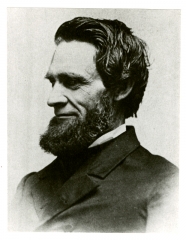thought the faculty should take a neutral stand leaving the decision to the Boards. When a majority of his colleagues became active partisans for the change he at first felt that they were injudicious and later, convinced by the arguments against removal, that they were wrong. All the faculty except Dr. Kendrick and Professor Philetus B. Spear joined in a letter urging Eaton not to prejudice Wilder’s efforts in New York. They pointed out that the Rochester brethren were the first to take effective steps to raise an endowment, which was so sorely needed, and that Madison County citizens had acted only when faced with the prospect of losing the University:
Nothing but necessity has prompted their effort & let that necessity be withdrawn & the subscription falls through & we are thrown farther back than ever from the attainment which we consider vital to the Institution’s prosperity. On the other hand let the enterprise go forward, unchecked by untimely interference, & then when the question comes up for final decision, we have at least an alternative, & a strong argument for endorsement to those who would retain it here.*
As a further check on Eaton, Professors A. C. Kendrick and Conant followed him to New York to talk with Deacon Colgate and others. In Eaton they had an impulsive, emotional antagonist who was to make anti-removal the great crusade of his life. Motivated by what he
*Faculty of Madison University to George W. Eaton, New York, N.Y., Dec. 27, 1847.





